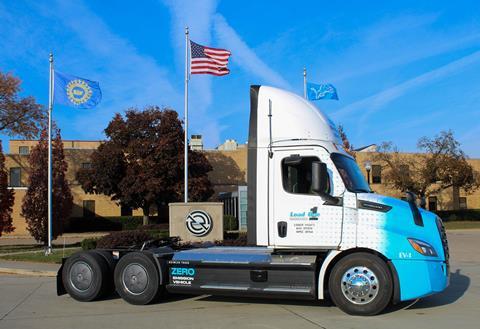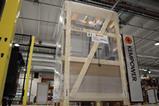Daimler Truck North America (DTNA), a leading North American manufacturer of medium- and heavy-duty trucks, has introduced its first electric Freightliner eCascadia for use in its logistics operations. This electric vehicle will be based at DTNA’s Detroit Diesel Corporation facility in Redford, Michigan, and will transport essential components between Detroit’s offsite warehouse and the production facility.

The electric Freightliner eCascadia, with a typical range of 220 miles, will operate within DTNA’s Detroit Logistics Center in Livonia. Load One LLC, a logistics provider working with DTNA since 2018, will operate the eCascadia as part of Detroit’s shuttle program. Load One’s experience and performance in on-time delivery make it a trusted partner for this initiative. “Investment in key partnerships, like our relationship with Load One, is critical to maintaining success as our industry transforms in the years to come,” noted Matt Pfaffenbach, Detroit plant manager.
Detroit Diesel Corporation, part of DTNA’s powertrain operations, is a central facility for commercial vehicle technology in North America. The Redford facility covers 38 acres, with 3.2 million square feet dedicated to production, research and development, and support functions. Nearly 2,800 employees work multiple shifts to manufacture powertrains, including the electric system used in the Freightliner eCascadia.
Load One executive chairman John K. Elliott II expressed enthusiasm about the partnership: “Load One is thrilled to work with our long-term partner Detroit and DTNA as we take the first steps together in ushering in a future generation of class 8 vehicles. Load One continues to work towards advancement and as a good steward to our planet.”
This project is part of DTNA’s broader initiative to integrate electric vehicles into its logistics operations, expanding efforts previously undertaken in regions including the Pacific Northwest, North Carolina, Arizona, and Mexico. DTNA has a long-term sustainability strategy, having achieved CO₂-neutral production at its Portland truck manufacturing plant in 2020 and aiming for similar targets at all remaining truck plants by 2026. Additionally, DTNA is focusing on battery lifecycle management through repair, remanufacturing, repurposing, and recycling.
DTNA’s electric vehicle integration reflects the company’s commitment to a sustainable supply chain and environmental responsibility, supporting its goal to create a more eco-friendly logistics network.


















